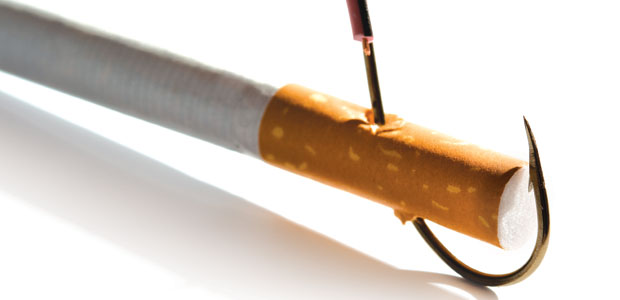Advertisement
Addiction Prescription
Endings for new beginnings

You’re determined (this time) to lose that weight, quit smoking or … You have the plan, the courage, the discipline, and the commitment. You have the gidgets and the gadgets. Why is it still an overwhelming challenge?
In the past we perceived addiction as a lack of willpower. Today most researchers consider addiction to be a disease by way of genetic predisposition usually triggered by familial, environmental, societal, and dietary factors.
All addictions are biochemically equal, says James Braly, MD, medical director of Immuno Labs, Inc. in Florida. The substance to which one is addicted, whether it is cigarettes, drugs, or sugar, becomes a necessary ingredient and affects the body chemistry. This creates withdrawal symptoms when the substance is withheld.
For many trying to wean themselves off an addiction, the pitfall becomes the very thing they use to replace the addiction, such as nicotine gum for smoking or excessive exercise for overeating.
Where to Begin
Facing the challenge of beating an addiction can be a daunting prospect. In order to be successful, Sheila Baxter, RN, of Laser Centers for Health on Vancouver Island, says that one needs to get to: “today is the day.” She adds that if one is at, “Yes, but I like the feel, or taste of ? it may not be the right time, and there is a greater chance of failure.
Once the commitment is made to kick the habit, there are three stages to success:
- Physical: withdrawal can be slight to severe
- Psychological: mind games, stress, and triggers
- Chemical: they can float around the body for several months
Nutritional Support
Stopping any addiction cold turkey without nutritional support can increase the failure rate. Nutrition and supplementation help to balance the body systems and combat withdrawal symptoms.
The pioneering Canadian psychiatrist Dr. Abram Hoffer stresses that nutrient deficiencies add to the problems associated with beating an addiction; proper nutritional support is just as important as counselling and other social supports.
Cleansing and healing the liver is important when confronting any addiction. Liver detoxification helps to rid cravings for nicotine, caffeine, and sugar. A powerful liver protector, milk thistle also encourages growth of new cells.
To help in successfully beating an addiction, the diet should incorporate healthy organic foods, including protein with each meal. (Most people in an addictive state are protein deficient). Eliminating sugar helps balance the blood sugar levels and gives the pancreas a rest.
In addition to a healthy diet, supplementation for the specific addiction assists the body to stop cravings and withdrawal symptoms. For example, narcotics addicts often suffer from a deficiency of essential minerals, especially magnesium, calcium, and potassium.
Give Yourself Time
Studies have indicated that it takes 30 days to change a habit. Quitting a habit is a process; slipping may be part of the process, but it doesn’t make you bad or weak. Get back on your plan. Eventually your life will evolve from a focus on not using to a healthy focus on other positive goals. Believe in yourself. Then help others.
Some Therapies to Try
- Counselling
- Biofeedback
- Visualization
- Brainwave training
- Hypnosis
- Meditation
- Chiropractic
- Acupuncture and auriculotherapy
- Laser therapy
- Hydrotherapy
- Yoga
- Qigong and other forms of exercise energy therapies
Smoking cessation Aids
- Nicotine replacement substances such as patches, gums, sprays, or inhalers are available at drug stores.
- Homeopathic remedies and essential oils such as cinnamon, clove, and nutmeg may be helpful.
- Allan Carr’s book The Easy Way to Quit Smoking (Sterling, 2005) challenges smoking myths.
NOT RECOMENDED
- Herbal cigarettes are not recommended due to the danger of inhalation of smoke of any kind. Austrian researchers, reporting in The Lancet, found that “vegetable-based” cigarettes produce a level of carbon monoxide similar to that produced by tobacco cigarettes.
Create a Written Plan
- Choose a date to quit.
- Choose methods that will work for you and your addiction. If one fails, you have other methods that will shore you up.
- Why do you want to quit?
- What will replace the addiction (that is not another addiction)?
- List your affirmations; the most powerful one I know and the one I used to quit smoking over 30 years ago is “I am a nonsmoker.” Say it throughout the day. Rationalize: if I am a nonsmoker why would I have this craving? If I am a nonsmoker why would I gain weight?
- List your support people.
- Record your habits for a few days before quitting. What are your patterns around the habit? Your emotions before having the cigarette or that Danish? Were you angry, sad, frustrated? Where were you? List alternative things you will do when in those situations.
- Do things to make it difficult to continue the habit, such as throwing out your cigarettes.
- Start your plan. Put your plan where you will see it often.
- Celebrate your successes.
Coping with Cravings
- Drink plenty of water. This flushes chemicals out of the system.
- Practise deep breathing. Breathe in for a count of four. Hold for a count of four. Breathe out to four.
- Delay. Take control. Allow the craving to pass.
- Change old habits that trigger the cravings.
Herbal Helpers for Specific Habits
- Feverfew, lime blossom, and camomile flower can help break the coffee habit.
- Oat straw has been used in India to help rebalance the endorphin levels of the brain in treating opium addictions.
- Stevia can help reduce sugar, tobacco, and alcohol cravings.
- Aromatherapy has many essential oils that help with addictions and support the body systems, as does homeopathy and Ayurvedic medicine.




